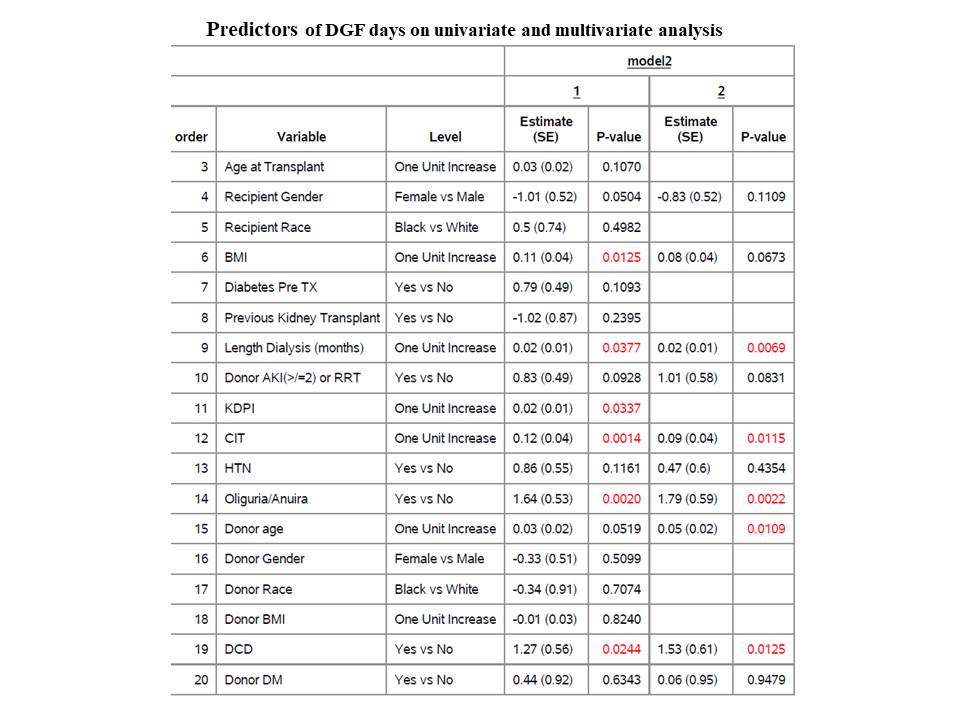Days of Delayed Graft Function and Its Impact on Graft Outcomes in Deceased Donor Kidney Transplant
1Department of Medicine, Mayo Clinic Arizona, Phoenix, AZ, 2Department of Statistics, Mayo Clinic Arizona, Phoenix, AZ, 3Department of Surgery, Mayo Clinic Arizona, Phoenix, AZ
Meeting: 2021 American Transplant Congress
Abstract number: 837
Keywords: Kidney transplantation, Prediction models, Rejection, Survival
Topic: Clinical Science » Kidney » Kidney Deceased Donor Selection
Session Information
Session Name: Kidney Deceased Donor Selection
Session Type: Poster Abstract
Session Date & Time: None. Available on demand.
Location: Virtual
*Purpose: There has been controversy regarding impact of delayed graft function (DGF) on risk of acute rejection and graft survival. This is likely due to DGF being reported as a dichotomous outcome and does not account for the difference in days of DGF.
*Methods: We studied predictors and impact of DGF days on transplant outcomes in subjects who received deceased donor kidney transplant from 2003 to 2019 at our center. We have high rates of DGF as we accept high KDPI, long CIT and donor kidneys with AKI. We excluded cases with primary non function unrelated to DGF and preemptive transplant. Recipient and donor characteristics were compared by DGF status using Kruskal-Wallis test for continuous variables and χ2 for categorical variables. Risk factors for DGF status and increased DGF days were assessed. We compared the chronic changes on the protocol biopsy performed from preimplantation to 4 month and 12 month. We used unadjusted and adjusted Cox Proportional Hazard model to assess graft survival, censoring for death events.
*Results: There were 701 subjects without DGF and 1021 recipients who had DGF. Factors that were significantly associated with higher DGF days on multivariable analysis included dialysis vintage, DCD status, CIT, donor age and donor oliguria. There was association of acute rejection with presence of DGF with but not with DGF days. Risk for BKV infection and graft survival was not associated with DGF days on multivariate cox -proportional hazard model. At 12-month biopsy, each additional day of DGF conferred 4.5% increased odds of chronic interstitial fibrosis progression and 3.7% increased odds of chronic tubular atrophy progression from baseline.
*Conclusions: This is first large cohort study to report the impact delayed graft function days on progression of fibrosis, rejection and graft survival. There is no higher risk of rejection, infection or graft survival. However, we did find association of DGF days with progression of fibrosis.
To cite this abstract in AMA style:
Budhiraja P, Butterfield RJ, Misra SS, Reddy KS, Kodali L, Khamash HA, Nair S, Mour GK, Chakkera HA, Jadlowiec CC, Janna H, Heilman RL. Days of Delayed Graft Function and Its Impact on Graft Outcomes in Deceased Donor Kidney Transplant [abstract]. Am J Transplant. 2021; 21 (suppl 3). https://atcmeetingabstracts.com/abstract/days-of-delayed-graft-function-and-its-impact-on-graft-outcomes-in-deceased-donor-kidney-transplant/. Accessed March 5, 2026.« Back to 2021 American Transplant Congress

